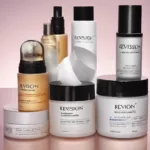24 January 2024
From reducing fine lines to treating acne, retinol is the ultimate game-changer in the world of skincare.
Retinol, a derivative of vitamin A, has long been hailed as the holy grail of skincare. With its ability to address a wide range of skin concerns, from fine lines to acne, it’s no wonder that retinol has become a staple in many skincare routines. But with so many retinol products on the market, finding the right one can be overwhelming. In this article, we will delve into the world of retinol, exploring how it works, its benefits, and the best ways to incorporate it into your skincare routine. We will also discuss the impending EU regulations on retinol products and recommend the best retinol products for different skin types.
The Science Behind Retinol
Retinol, a type of retinoid, works by accelerating the rate of cell turnover in the skin. This means that new, fresh skin cells are produced faster, resulting in a host of aesthetic benefits. Dr. Anita Sturnham, a GP and skin health specialist, explains that retinoids work at a deep cellular level, boosting collagen and elastin production, reducing cellular aging, and regulating sebum production. It is important to note that vitamin A cannot be produced by the body and must be supplied through diet and topical skincare.
The Benefits of Retinol
Numerous studies have shown the effectiveness of retinol in reducing the signs of aging, such as roughness, hyperpigmentation, and wrinkles. Retinol also shows promise in treating acne, reducing breakouts, and improving skin texture and pigmentation. Its ability to address a wide range of skin concerns makes it a versatile ingredient for many skin types.
Understanding the Retinoid Family
The term “retinol” is often used interchangeably with “retinoid,” causing confusion among consumers. The retinoid family includes retinol and its natural derivatives, such as retinaldehyde and retinyl esters, as well as synthetic derivatives. It is important to note that retinoids must be converted into retinoic acid within the skin before they can regenerate skin cells and stimulate collagen production. Prescription products contain pure retinoic acid, while non-prescription products require conversion, which may take longer to achieve desired results.
Potential Side Effects of Retinol
While retinol is a powerful ingredient, it is essential to use it correctly to avoid potential side effects. Some brands may use ineffective quantities of retinol, while others may have formulations that are too strong, leading to dryness, flaking, and irritation. However, advancements in formulation and delivery systems have minimized these side effects. Slow-release encapsulation delivery systems and advanced formulations help reduce irritation, making retinol products more tolerable for sensitive skin.
How to Incorporate Retinol into Your Skincare Routine
Proper application is key to achieving success with retinol. It is recommended to use retinol at night, after cleansing and before applying a gentle night cream. Start by using retinol once a week and gradually increase usage to every other night. Patience is essential, as results may take three to six months to become noticeable. It is crucial to wear broad-spectrum SPF daily when using retinol, as it can make the skin more sensitive to sunlight.
Increasing the Strength of Your Retinol
Knowing when to increase the strength of your retinol is important for continued benefits. Skin expert Dr. Sam Bunting suggests considering whether you have reached your skincare goals and whether your skin is tolerant of the retinoid. If you haven’t achieved your goals and your skin is tolerant, it may be time to step up to a higher strength retinol. Many brands offer products in incremental strengths, allowing you to gradually increase potency.
The Impending EU Retinol Regulations
The European Commission is currently reviewing regulations for over-the-counter retinol products. The proposed regulation aims to restrict the concentration of retinoids to avoid overexposure to vitamin A. It is important to consider these regulations in context, as our intake of vitamin A through diet is often higher than through skincare. The new regulations will come into force by the end of 2023, giving brands three years to reformulate their products if they exceed the new limits.
Retinol and Sensitive Skin
Contrary to popular belief, retinol can be used by those with sensitive skin. One tip is to create a “retinol sandwich” by applying a moisturizer to sensitive areas before applying retinol. This method helps minimize irritation and allows the skin to adjust to retinol over time.
Conclusion: Retinol is a powerhouse ingredient in skincare, with the ability to address a wide range of skin concerns. Understanding how retinol works, its benefits, and how to incorporate it into your skincare routine is crucial for achieving the best results. As the EU prepares to implement new regulations on retinol products, it is important to stay informed and choose products that comply with these standards. By following expert advice and selecting the right retinol product for your skin type, you can harness the power of this transformative ingredient and achieve healthier, more radiant skin.



